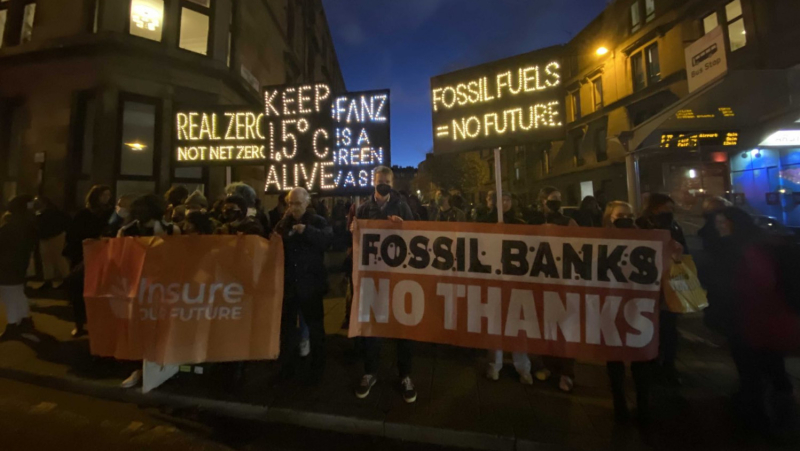The NZBA has chosen the wrong side of history: what next for net-zero banking?

Blog by Quentin Aubineau, Policy Analyst, BankTrack
Last month, most Net-Zero Banking Alliance (NZBA) member banks voted to abandon the alliance’s headline commitment to align finance with 1.5ºC. Its new framework no longer expects guidelines on climate target-setting to be applied on a comply-or-explain basis (as in the previous version) – instead, these are to be taken merely as recommendations. This shift “significantly undermines the effectiveness of the NZBA” to achieve 1.5ºC, according to Triodos Bank, which left the alliance following the announcement.
This was a watershed moment for the NZBA. While we have been very critical of the way the alliance’s outcomes have fallen short of its own ambition in the past, this decision removed any doubt about whether the NZBA was reformable. Substituting the strict 1.5ºC commitment for “well-below 2ºC” appears very cynical. The IPCC’s 2018 report on the topic provides crystal-clear information regarding the disastrous impacts resulting from global warming above 1.5C. Every fraction of a degree of warming matters.
It is crucial to tackle the arguments that banks and the NZBA have advanced to explain this decision, both to prevent further backsliding on banks’ individual 1.5ºC climate commitments, where they still have them, and to ensure banks implement concrete measures to meet these commitments.
The NZBA is a diversion to delay concrete actions
The need for “financing real economy decarbonization”, which the NZBA centred in its media release announcing its recent decision, is clearly incompatible with financing fossil fuel expansion. And yet, for the past four years, the NZBA and its members have for the most part avoided concrete action towards reducing such finance. (With a few exceptions, for example La Banque Postale, Danske Bank and Svenska Handelsbanken).
From the very start, the lack of an explicit requirement for NZBA members to stop financing companies pursuing fossil fuel expansion and the adhesion of the biggest “fossil banks” to the initiative were key concerns for civil society organizations. For the past four years, together with partners, we have insisted that financing fossil fuel expansion is incompatible with the 1.5º climate goal and asked NZBA banks to live up to their commitment and stop fossil fuel finance. However, the NZBA has always avoided recognising this and has pushed to shift the narrative towards mid- and long-term targets to reduce financed emissions. These targets are a smokescreen allowing banks to continue the financing of new fossil fuels in the short-term.
Independent research shows that “voluntary private-sector initiatives may have relatively little impact on decarbonization”. The previous NZBA framework was already not effective at tackling real-world issues, and the NZBA itself has pointed out challenges faced by its members. In removing the comply-or-explain basis, the new guidance will only accentuate this trend.
The fossil banks have taken charge of the NZBA
The NZBA’s objective to bring together as many banks as possible to align their portfolios with net-zero by 2050 was laudable. However, it was always going to be challenging to have the big global fossil fuel financiers, the smaller progressive banks and everyone in between, all in the same room. Last month’s announcement only confirmed that the first category, the fossil banks, set the NZBA’s agenda, in direct conflict with the alliance’s own mission.
Triodos Bank put it explicitly: it left it because it “does not believe it can still effectively influence the NZBA and its members to move the dial”. Since there are still progressive banks within the NZBA, maybe they believe they still do have influence. But with the new guidance, now more than ever, it’s hard to see any difference in ambition between the big fossil fuel financiers inside the NZBA and those outside. There is certainly no sense of a race to the top.
Overall, the outcome of the vote confirms that the NZBA is now irrelevant to tackling the climate crisis. What really counts is banks’ individual commitments, whether they are NZBA members or not. We will now be watching closely whether NZBA banks and others now weaken their individual commitments.
Banks are not in the passenger seat. They must do their fair share
Another plank of the NZBA’s explanation of its decision to drop 1.5º was the idea that “the external landscape for banks has rapidly changed”. And it’s certain that the world is not the same as it was a few months ago, let alone four years ago. However, when the NZBA was launched in 2021, the world was already not on track for 1.5ºC. When banks voluntarily committed to align with a maximum temperature rise of 1.5ºC, no one expected them to save the world, but they were expected to do their fair share. Four years later, most of them are still financing the fossil fuel expansion that is pushing the world off-track from a 1.5ºC trajectory.
Further, since the adoption of the Paris Agreement in 2015, many other actors have also committed to align their activities with 1.5ºC, including cities, regions and companies. They are also operating in a world that is off-track to achieve the 1.5ºC objective. However, so far, the sectors that are most notably stepping back on their previous climate commitments are the fossil fuel industry (e.g. BP, Shell) and the financial sector (e.g. HSBC, Wells Fargo, among others). Ironic that it is precisely the main fossil fuel developers and their financial backers that are the quickest to change course due to shifts in the “external landscape”.
Despite what they say, banks are not in the passenger seat. Their financed emissions are not just the result of external factors, the climate trajectory, or the global economy. They are the outcome of banks’ individual policy and portfolio allocation choices. When banks committed to align their activities with 1.5ºC, it was already clear that some of their financing was not aligned, and that they would have to take tough decisions if they were to meet their goals.
If banks had hoped that governments and other sectors of the economy would take these tough decisions for them, the NZBA would not have been necessary in the first place. There would have been no point in spending so much time on developing these financed emissions and target-setting methodologies to begin with. “External landscape changes” cannot justify banks avoiding doing their fair share.
1.5 is not completely dead yet, but urgent action is needed
In 2024, for the first time, the world’s average temperature was “likely”, according to the World Meteorological Organization, to be more than 1.5ºC above the pre-industrial average. But this does not mean the 1.5ºC climate objective is dead. The United Nations explicitly states that “monthly and annual breaches of 1.5°C do not mean that the world has failed to achieve the Paris Agreement’s temperature goal, which refers to a long-term temperature increase over decades, not individual months or years”. Rather, those breaches “are early signs of getting perilously close to exceeding the long-term limit, and serve as clarion calls for increasing ambition and accelerating action in this critical decade”. Unfortunately, the NZBA and most of its member banks seem not to have heard these clarion calls.
Earlier this year in Davos, the UN Secretary-General António Guterres pointed out that financial institutions and industries backtracking on climate commitments “are on the wrong side of history” and “on the wrong side of science”. With this vote, the NZBA has chosen to backslide – it has chosen to be on the wrong side of history. Its main legacy now looks to have been its contribution to shifting the narrative away from the need for immediately stopping fossil fuel finance expansion, and towards managing down net financed emissions towards a distant 2050 goal.
Every bank, NZBA member or not, should now hear the clarion call of our dangerously warming world, affirm or reaffirm a commitment to the 1.5°C global goal, and take immediate action to align their finance with this goal. The first and most important action is to put an immediate full stop to financing fossil fuel expansion.

